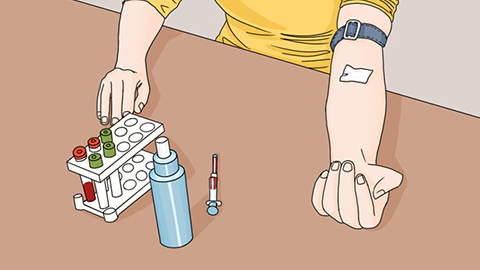Post-Donation Precautions and Dietary Restrictions
Generally, the precautions to take after blood donation include proper rest, nutritional supplementation, protection of the puncture site, avoiding blood donation again in a short period of time, and monitoring physical condition. Spicy foods such as chili peppers, fried peanuts, white spirits, ice cream, salted fish, and similar items should not be consumed. Specific details are as follows:

I. Precautions
1. Appropriate rest: After blood donation, ensure sufficient sleep and avoid staying up late or overexertion, allowing the body adequate rest and recovery. Within 1-2 days after donation, avoid strenuous physical activities such as running, weightlifting, basketball, and other intense sports, to prevent excessive physical strain.
2. Nutritional supplementation: After blood donation, consume more protein-rich foods such as lean meat, eggs, and milk. Also include iron-rich foods like pork liver, chicken liver, and spinach, along with vitamin C-rich foods such as pomelo, oranges, and strawberries, to enhance iron absorption and utilization.
3. Protect the puncture site: After blood donation, keep the puncture site clean and dry, avoiding contact with water and infection. Within 24 hours after donation,尽量 avoid contact with water at the puncture site, and refrain from rubbing or scratching the area to prevent bruising, swelling, or infection.
4. Avoid donating blood again in a short period: To ensure the donor's health and blood quality, there should be a certain interval between donations. The interval between two donations should be no less than six months. This is because during blood donation, some blood components such as red blood cells, white blood cells, and platelets are lost.
5. Monitor physical condition: After blood donation, closely monitor your physical condition. If symptoms such as dizziness, fatigue, or pale complexion occur, seek medical attention immediately. In the days following donation, continue to observe for other abnormal reactions such as fever or rashes, to allow timely detection and treatment.
II. Foods to Avoid
1. Chili peppers: Chili peppers are spicy foods. Capsaicin in chilies can irritate the gastrointestinal mucosa, causing congestion. After blood donation, the body is in a recovery phase and the gastrointestinal function is relatively weak. Consuming chili peppers may lead to gastrointestinal discomfort symptoms such as stomach pain, abdominal pain, and diarrhea, hindering a smooth recovery.
2. Fried peanuts: Fried peanuts are high-fat foods. Consumption after blood donation increases the digestive burden on the gastrointestinal tract. Eating greasy fried peanuts after donation can easily cause indigestion, nausea, and other symptoms. Additionally, their high fat content is not conducive to rapid recovery to the pre-donation physical state.
3. White spirits: White spirits contain high levels of alcohol. After consumption, alcohol is mainly metabolized in the liver. After blood donation, the liver needs to focus on helping the body recover hematopoietic functions. Drinking alcohol at this time increases the burden on the liver.
4. Ice cream: Ice cream is a cold food. After blood donation, the gastrointestinal tract is more sensitive. Consuming ice cream may cause sudden constriction of gastrointestinal blood vessels, leading to gastrointestinal spasms and resulting in abdominal pain, diarrhea, etc. This not only causes physical discomfort but also interferes with the body's normal recovery process.
5. Salted fish: Salted fish is a high-salt processed food. High-salt foods increase the burden on the kidneys. After blood donation, the body needs coordinated recovery of various organs, and an increased burden on the kidneys will affect the overall recovery process.
After blood donation, maintaining good lifestyle habits such as adequate sleep and moderate exercise can help the body recover quickly.





